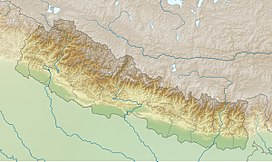Mount Everest (also known in Nepal as Sagarmatha and in Tibet as Chomolungma) is the Earth‘s highest mountain. It is located in the Mahalangur section of the Himalayas. Its peak is 8,848 metres (29,029 ft) above sea level[1] and is the 5th furthest point from the center of the Earth.[6] The international border between China and Nepal runs across the precise summit point. Its massif includes neighboring peaks Lhotse, 8,516 m (27,940 ft); Nuptse, 7,855 m (25,771 ft) and Changtse, 7,580 m (24,870 ft).
In 1856, the Great Trigonometric Survey of India established the first published height of Everest, then known as Peak XV, at 29,002 ft (8,840 m). The current official height of 8,848 m (29,029 ft) as recognized by Nepal and China was established by a 1955 Indian survey and subsequently confirmed by a Chinese survey in 1975. In 1865, Everest was given its official English name by the Royal Geographical Society upon a recommendation by Andrew Waugh, the British Surveyor General of India. Waugh named the mountain after his predecessor in the post, Sir George Everest. Although Tibetans had called Everest "Chomolungma" for centuries, Waugh was unaware of this because Tibet and Nepal were closed to foreigners at the time thus preventing any attempts to obtain local names.
Mount Everest attracts many highly experienced mountaineers as well as capable climbers willing to hire professional guides. There are two main climbing routes, one approaching the summit from the southeast in Nepal (known as the standard route) and the other from the north in Tibet. While not posing substantial technical climbing challenges on the standard route, Everest presents dangers such as altitude sickness, weather, wind as well as significant objective hazards from avalanches and the Khumbu Icefall. While the overwhelming majority of climbers will use bottled oxygen in order to reach the top, some climbers have summitted Everest without supplemental oxygen.
The first recorded efforts to reach Everest’s summit were made by British mountaineers. With Nepal not allowing foreigners into the country at the time, the British made several attempts on the north ridge route from the Tibetan side. After the first reconnaissance expedition by the British in 1921 reached 7,000 m (22,970 ft) on the North Col, the 1922 expedition pushed the North ridge route up to 8,320 m (27,300 ft) marking the first time a human had climbed above 8,000 m (26,247 ft). Tragedy struck on the descent from the North col when seven porters were killed in an avalanche. The 1924 expedition resulted in the greatest mystery on Everest to this day: George Mallory and Andrew Irvine made a final summit attempt on June 8 but never returned, sparking debate as to whether they were the first to reach the top. They had been spotted high on the mountain that day but disappeared in the clouds, never to be seen again until Mallory’s body was found in 1999 at 8,155 m (26,755 ft) on the North face. Tenzing Norgay and Edmund Hillary made the first official ascent of Everest in 1953 using the southeast ridge route. Tenzing had reached 8,595 m (28,199 ft) the previous year as a member of the 1952 Swiss expedition.
Everest from space
Aerial photo of Everest from the south, behind Nuptse and Lhotse
Mount Everest showing the summit pyramid (Ordovician limestone) above the distinctive "Yellow Band" (above the dashed yellow line). Everest
Series pelites and quartzites comprise of the bulk of the mountain below the Yellow Band, of uncertain age (Cambrian?). Click photo to enlarge
في المرفقات
-
 Mount Everest.docx (75.7 كيلوبايت, 64 مشاهدات)
Mount Everest.docx (75.7 كيلوبايت, 64 مشاهدات)















